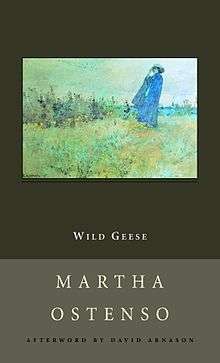Martha Ostenso

Martha Ostenso (17 September 1900 – 24 November 1963) was a Canadian novelist and screenwriter.
Background
Ostenso was born in Haukeland (now part of Bergen), in Hordaland County, Norway. Her parents were Sigurd and Olina (née Tungeland) Ostenso. She emigrated with her family, first settling in the province of Manitoba, Canada, before moving to South Dakota and Minnesota. Ostenso taught in a rural school and attended the University of Manitoba for approximately one year; she never graduated.[1] While studying at the University of Manitoba, she was a student of Douglas Durkin, a professor in the English Department (Ostenso may have actually met him while she was a high school student). Shortly thereafter Durkin left his wife and children and moved to New York City; Ostenso joined him there. They lived together in New York, where she studied at Columbia and worked as a social worker; they were active in the literary circles of the time. They later moved to Minnesota. After Durkin's wife died, he and Ostenso married in 1945. They had no children together.
Biography
Ostenso is probably best known for the award-winning novel Wild Geese, published in 1925. Hailed by critics as a landmark in Canadian realism, the novel is a story about a young schoolteacher sent to teach in rural Manitoba. Wild Geese won the 1925 Dodd, Mead and Company Best Novel of the Year Award and brought her much popular and critical attention. It made her a well-known and best-selling author.[2] The novel was filmed as Ruf der Wildgänse in 1961 as a West-German and Austrian co-production and as After the Harvest in 2001 as a made-for-television movie for Canadian TV. The movie starred Sam Shepard.
Ostenso continued to publish short stories, novels and wrote a number of screenplays. Although it is now known that Ostenso collaborated with her husband, fellow novelist Douglas Durkin, all their writing appeared under her name alone. Ostenso produced fifteen more novels, the most successful of which was O River, Remember, a novel about a family in the Red River Valley of Minnesota which won a Literary Guild selection in 1943.[2]
Many of her novels were based on Minnesota farm life; most incorporate elements of romance and melodrama. Ostenso portrays the lives of rural immigrants with dignity. Although none of her later novels ever reached the acclaim Wild Geese attracted, most continued to explore a similar theme: the relationship between men and women and the land they work. A number of her other works were translated and have been reprinted several times.[2]
Ostenso and Durkin lived for a time in Hollywood, California, where they had friends among some of the greatest movie stars of the 1930s and 40s. Regrettably, the lifestyle had a negative impact on both Ostenso and Durkin, leading to less productivity and quality of their work. In 1963, the couple moved to Seattle, Washington, to be near Durkin's sons. Shortly after the move, Martha Ostenso died from cirrhosis of the liver, the result of years of heavy drinking.
Asked how to pronounce her name, she told The Literary Digest, "Of the three syllables in Ostenso, the first receives the major accent, the second is without accent, the third receives a minor accent. The final result is as if you spoke the name Austin and added so as an afterthought... Since I was born in Norway, I suppose I should insist on the Norwegian values. But I don't. I am even weary of correcting people who insist that it is Ostenso. However, the Norwegians say Östensö... The accent is the same, so perhaps I am not too pedantic in maintaining that accent, since I have to sacrifice the vowel character." [3]
Selected bibliography
- A Far Land, Ostenso's only book of poetry. (1924)
- Wild Geese (1925)
- The Dark Dawn (1926)
- The Mad Carews (1927)
- The Young May Moon (1929)
- The Waters Under the Earth (1930)
- Prologue to Love (1931)
- There's Always Another Year (1933)
- The White Reef (1934)
- The Stone Field (1937)
- The Mandrake Root (1938)
- Love Passed This Way (1942)
- And They Shall Walk (1943, with Sister Elizabeth Kenny)
- O River, Remember! (1943)
- Milk Route (1948)
- The Sunset Tree (1949)
- A Man Had Tall Sons (1958)
References
- ↑ Encyclopedia of Literature in Canada. Edited by W. H. New . Toronto: University of Toronto Press. p.854-55. ISBN 0-8020-0761-9
- 1 2 3 Buckley, Joan N. “Martha Ostenso: Norwegian-American Immigrant Novelist” (NAHA. Volume 28: Page 69
- ↑ Charles Earle Funk, What's the Name, Please?, Funk & Wagnalls, 1936
Further reading
Hammill, Faye (2008). "Martha Ostenso, Literary History, and the Scandinavian Diaspora". Canadian Literature. 196 (Spring): 17–31, 202.
External links
- The Canadian Encyclopedia
- The Literary Encyclopedia
- St. Louis Park Historic Society”
- Minnesota Historical Society